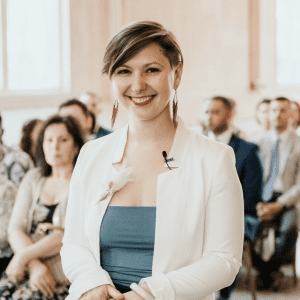“Making the Ideal Real.” Member Spotlight: Olga Liapis-Muzzy
Olga Liapis-Muzzy is an experienced mediator and facilitator based in Washington DC. Although she considers herself to be a newer member of MBBI, she has “always loved” member organizations. This love stems, she says, from her background in union organizing as part of the Labor movement.
Background

Her career began, first as an organizer, before eventually moving into a facilitation role, as well as working on training programs. This formative experience of working in member organizations that are trying to effect change, sometimes global change, and change which is often fraught with conflict, led Olga on a slow progression towards mediation. She explains that, after many years of facilitating meaningful group dialogues, she stumbled across the work of Ken Cloke, founder of MBBI, and she “just realized how much more possibility there was in this work, if I could figure out a bit more about how people get along and how people fight and resolve conflict, and actually problem-solve together.”
About a year ago, Olga left her job after deciding she wanted to devote more time to practicing mediation. She began working as a consultant, and quickly realized that the solitary nature of the work was lonely. She “profoundly missed the collaborative experience of working with a team of others on a project.” After being invited to work on a project in partnership with many MBBI members, Olga realized the joy of working creatively and collaboratively with other mediators, and found the global reach of MBBI to be an effective way to connect with “lots of people who are interested and working towards the same things as I am.”
Turning words into actions
Our conversation returns to this theme of collaboration on several occasions. Emphasizing that in order to have a better world, we all need to collectively realize that we’re all in this together, Olga reminds me that this “change starts small,” often by making small changes in your personal world, or your professional world. Olga’s hope for this better world is infectious. Turning the camera to show me her values, neatly displayed on the wall above her desk, Olga explains that her values do not merely represent a loose commitment or idealism. Indeed, one of her values is idealism, which she defines as “making the ideal real”. She describes this as a process of asking ourselves: “what is that big change that we’re reaching for, and then how do we make that as personal as possible?”
Currently, Olga is working on answering this question, not only in words, but in action. She’s working to espouse these values not only personally, but also in the work she does – in fact, in all aspects of her life. Part of this involves working with organizations who are driven by the same goals as she is, who recognize the challenges we are all collectively facing and are working, in their own way, towards tackling them. As a consultant, Olga offers support towards improving collaboration, problem-solving, and conflict resolution practices. Another, newer element of Olga’s work involves providing one-on-one support for communities who are not necessarily corporate organizations with employees, but who may be doing community action work. This excites her, because “all of these spaces are humans interacting with other humans, which are of course fraught with conflict, but also possibility.”
For Olga, what draws her to mediation is that “conflict is unavoidable. We can wish for it to not happen, we can wish that we were not in it, but that’s wasted energy. An orientation that feels much more grounding and useful is having instead a practice of conflict resilience. Being able to experience conflict as neutral, not negative or positive, just full of possibility.” Based upon this principle, Olga will soon be launching a training course for the month of January, called Road to Resolution. This month-long program will experiment with conflict resolution practices that participants can implement into their own lives, giving them the skills to approach conflicts differently.
“A tree does not grow overnight”
So, what’s next for Olga? She continues to work towards imbuing her values into all aspects of life, explaining that while it’s easy to be high-minded in one’s values, “if we don’t figure out how to make our values into a reality we’re never going to get anywhere.”
This process of figuring out how to effect the change we wish to see may not occur overnight, but Olga reminds me not to be discouraged. Plucking a well-thumbed copy of Emergent Strategy from her bookshelf, Olga explains that one of the lessons the book taught her is that we can learn to apply concepts from the natural world to everyday life. Nature teaches us that “change is slow – it’s constant, but slow. A tree does not grow overnight.”
As conflicts across the world become more entrenched and more protracted, our capacity for hope and understanding may diminish. But we must keep going, keep asking: “how are we going to collaborate and save our ability to live on this earth? Because that’s in jeopardy!”
As we part ways, I am hopeful that, should enough of us choose to accept Olga’s help and wisdom, the world may be alright after all.
Article by Natalie Dewar, MBBI Writer
